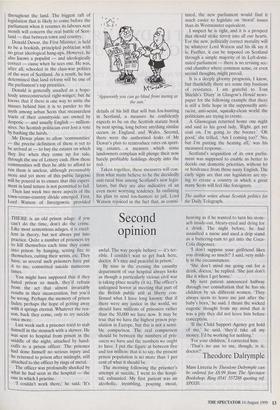Second opinion
THERE is an old prison adage: if you can't do the time, don't do the crime. Like most sententious adages, it is excel- lent in theory, but not always put into practice. Quite a number of prisoners try to kill themselves each time they come into prison: by hanging, setting fire to themselves, cutting their wrists, etc. They have, as several such prisoners have put it to me, committed suicide numerous times.
You might have supposed that if they hated prison so much, they'd refrain from the act that almost invariably results in their incarceration, but you'd be wrong. Perhaps the memory of prison fades; perhaps the hope of getting away with it springs eternal. Whatever the rea- son, back they come, only to try suicide once more.
Last week such a prisoner tried to stab himself in the stomach with a skewer. He was sent to hospital from prison in the middle of the night, attached by hand- cuffs to a prison officer. The prisoner had done himself no serious injury and he returned to prison after midnight, still attached to the officer by rings of metal.
The officer was profoundly shocked by what he had seen in the hospital — the one in which I practise. `I couldn't work there,' he said. 'It's awful. The way people behave — it's ter- rible. I couldn't wait to get back here, doctor. It's nice and peaceful in prison.'
By nine in the evening the casualty department of our hospital always looks as though a particularly vicious civil war is taking place nearby (it is). The officer's unfeigned horror at meeting that part of the British public still at liberty con- firmed what I have long known: that if there were any justice in the world, we should have millions of prisoners rather than the 50,000 we have now. It may be true that we have the highest prison pop- ulation in Europe, but this is not a sensi- ble comparison. The real comparison should be between the numbers of pris- oners we have and the numbers we ought to have. I put the figure at between five and ten million: that is to say, the present prison population is no more than 1 per cent of what it should be.
The morning following the prisoner's attempt at suicide, I went to the hospi- tal, exhausted. My first patient was an alcoholic, trembling, pouring sweat,
heaving as if he wanted to turn his stom- ach inside-out, bleary-eyed and dying for a drink. The night before, he had assaulted a nurse and used a drip stand as a battering-ram to get into the Coca- Cola dispenser.
`I don't suppose your girlfriend likes you drinking so much?' I said, very mild- ly in the circumstances.
`She don't mind me going out for a drink, doctor,' he replied. 'She just don't like it when I get home.'
My next patient announced halfway through our consultation that he has six children by six different women. 'They always seem to leave me just after the baby's born,' he said. I thrust the wicked eugenic thought from my mind that it was a pity they did not leave him before conception.
`If the Child Support Agency got hold of me,' he said, 'they'd take all my money. I'd be working for nothing.'
`For your children,' I corrected him. `That's no use to me, though, is it,
doctor?' Theodore Dalrymple Mass Listeria by Theodore Dalrymple can be ordered for £8.99 from The Spectator Bookshop. Ring 0541 557288 quoting ref SP020.


























































 Previous page
Previous page